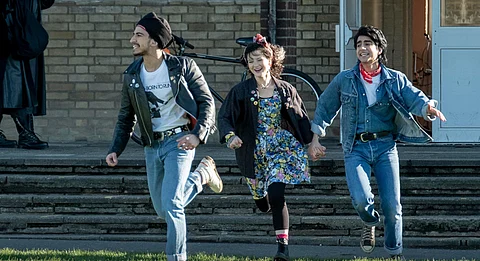
- Reviews
- Power List 2024
- Cannes 2024
- In-Depth Stories
- Web Stories
- News
- FC Lists
- Interviews
- Features
- FC SpecialsFC Specials

Director: Gurinder Chadha
Cast: Viveik Kalra, Hayley Atwell, Rob Brydon, Kulvinder Ghir
When nobody is listening, there's always music. We are in a position to share music with strangers today and forge timeless bonds over these words, but what about a time when the only person who could experience this intimate obsession was…yourself? This is the universal language of introverts and outsiders. Who better, then, than a shy South Asian boy in small-town Britain in the '80s to embrace this language? What better template than the age-old father-son generational conflict to hinge on it? Gurinder Chadha's Blinded by the Light combines two cinematic universes that are an organic fit for each other: the underdog immigrant story and the coming-of-age artist tale. The result is a sweet-natured and curiously rooted movie – a fairytale about more than just a brown kid and his adoration for "The Boss" Bruce Springsteen – that hits this cynical world in the right place at the right time. If the sound of the stray song can unite lost souls, it also seems to have resurrected Chadha's; maybe it had to be the flannel-shirted, era-defiant Springsteen that sparked her first decent film since her epoch-making debut, Bend It Like Beckham (2002).
Based on a memoir by British-Pakistani journalist Sarfraz Mansoor, Blinded by the Light is about Javed (an affable Viveik Kalra), an introspective Pakistani boy torn between trying to fit into the very English Luton town and grow out of his traditional family's stubbornly working-class values. This conflict of balance is what has defined quintessential "NRI" movies for decades now. Springsteen becomes Javed's only hope in an age where, like any other age, a politician (Margaret Thatcher) left behind a nation divided by skin colour and unemployment. In this context, there are some beautifully theatrical scenes that embody the pure and transformative power of that "first time," of falling in love with your favourite artist – the lyrics of "Dancer in the Dark" and "Prove it all Night" swirl across the screen, dotting his bleak surroundings, making him feel like he is the hero of a pensive Springsteen video and the only one these songs were ever meant to talk to. You get Javed. He starts speaking in those words, and starts expressing himself through his writing – girlfriend, journalism, believers, perspective…Springsteen becomes the soundtrack of his adolescence, which for many daring immigrants is more than just a phase of emotional uprising.
Chadha's film isn't extraordinary. It's nothing we haven't seen before. It's sappy, sentimental and unabashedly infectious. But it's something we need to feel today ("Writers are supposed to tell the world its truth"), and something that, only secondary to the rousing song-and-dance musical, might be the next best thing for a generation that has forgotten how to be heard. There is a lot of nobility and hope embedded into the DNA of this film: simple emotions that might be received differently in different parts of the globe.
For example, as I watched it at a packed Sundance screening in the mountains of "new-age" America, I was intrigued by the reactions. While I rolled my eyes at the caricaturish depiction of the stern Asian dad, the African-American lady next to me gasped in disbelief at the severity of his actions. She rooted for Javed at moments that were far too obvious for me. When the old man croaks "Write your stories, but don't forget ours," several Bollywood mainstream images flashed through my mind; the rest of the hall was rapt, amazed by the loud and disarming innocence of a culture that has long been generalized by global English-language movies. When Javed in a monologue cites Springsteen's America as an example of secularity and acceptance in comparison to '80s Britain, the entire hall sniggered at the irony of these lines. You could almost hear them cough "Trump". That might have been me, had it been a Saudi Arabian or North Korean citing India as an example of equality and racial tolerance on screen.
It's why the blatant melody of this movie seems to have touched a cord at the beginning of 2019, at the first fiercely "independent" film festival of the year – they stand for the same values and inclusion, in creative defiance of many seemingly democratic administrations around the world. What such films, such events, end up reminding us of is this: Sometimes, you just need to feel good. To feel heard. As history lies witness, there's never a bad time for that.